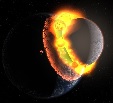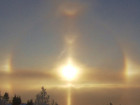|
Science and Astronomy Questions
|
|
| Watsisname | Date: Thursday, 29.09.2016, 06:08 | Message # 781 |
 Galaxy Architect
Group: Global Moderators
 United States
United States
Messages: 2613
Status: Offline
| Or perhaps even early... an odd fluke of environmental and evolutionary circumstances. But I think simple life probably develops fairly quickly in general, if circumstances are favorable. It seems that there are a lot of opportunities for it to happen, so that if it can, it does. And we still can't discount the idea of multiple independent geneses of life on Earth -- the shadow biospheres.

|
| |
| |
| steeljaw354 | Date: Thursday, 29.09.2016, 09:42 | Message # 782 |
 World Builder
Group: Users
 Pirate
Pirate
Messages: 862
Status: Offline
| Could surface life develop on Ice worlds with an atmosphere pressure with about 1 atmosphere? What sort of surface life?
|
| |
| |
| PlutonianEmpire | Date: Sunday, 02.10.2016, 06:07 | Message # 783 |
 Pioneer
Group: Users
 United States
United States
Messages: 475
Status: Offline
| I was reading this earlier: http://climate.nasa.gov/climate_resources/24/
With the way things are going, and taking a realistic pessimist route for the future, is it possible we'll cause the CO2 to reach lethal levels at some point, sans natural events like volcanoes?
Edit: And on a slightly unrelated question, how are we affecting he percentages of the other gases in our atmosphere with our constant output of various gases, no matter how much or how little?
Specs: Dell Inspiron 5547 (Laptop); 8 gigabytes of RAM; Processor: Intel® Core™ i5-4210U CPU @ 1.70GHz (4 CPUs), ~2.4GHz; Operating System: Windows 7 Home Premium 64-bit; Graphics: Intel® HD Graphics 4400 (That's all there is :( )
Edited by PlutonianEmpire - Sunday, 02.10.2016, 06:12 |
| |
| |
| Watsisname | Date: Sunday, 02.10.2016, 09:21 | Message # 784 |
 Galaxy Architect
Group: Global Moderators
 United States
United States
Messages: 2613
Status: Offline
| Quote PlutonianEmpire (  ) With the way things are going, and taking a realistic pessimist route for the future, is it possible we'll cause the CO2 to reach lethal levels at some point, sans natural events like volcanoes?
Do you mean by being toxic to breathe? If so, no. It doesn't become dangerous for breathing until a few tens of thousands of ppm (a few percent). There's not enough carbon stored in fossil fuels to do this. It's hard to compute exactly how high we could raise the CO2 by burning all of known fossil fuels, since it would change the carbon cycling in complex ways, but we could probably push it over a thousand ppm if we wanted to. Of course that would have a very big impact on the climate.
Quote PlutonianEmpire (  ) And on a slightly unrelated question, how are we affecting he percentages of the other gases in our atmosphere with our constant output of various gases, no matter how much or how little?
Methane is the next big one. Combustion of fossil fuels, by oxidizing the carbon, also decreases the concentration of O2 by a stoichiometric amount, but this is a tiny fraction of the total amount of O2 in the air so we don't really notice it. Then there are a large variety of other gases we emit to the atmosphere in smaller amounts, some of which are greenhouse gases or affect the ozone layer or do other things. These can have a variety of residence times, too -- we emit a lot of SO2 for example, but it doesn't stick around for a long time.
Another interesting thing is the increase in the amount of water vapor in the air. This isn't due to an emission of it, but rather because the air is getting warmer and warmer air can hold more moisture. This follows from the Clausius Clapeyron relation, where the saturation level increases by about 7% per degree Celsius.

|
| |
| |
| spacer | Date: Wednesday, 05.10.2016, 01:20 | Message # 785 |
 Star Engineer
Group: Users
 Israel
Israel
Messages: 1258
Status: Offline
| did you ever find yourself at 4:00 am reading about some nuclear physics? 
tonight i read a nasa tweet about them using liquid hydrogen for thier rockets, so i started wondering why liquid and not gas.
i found out it becuase of the density?
any way starting with a simple tweet and here after an hour i found myself reading about the Triple point and it was actually interesting becuase i learn chimestry.
so i guess that why on mars water is closer to the triple point? when its also solid, liquid and gas. the pressure on mars is pretty small so it goes very close to the triple point.
"we began as wanderers, and we are wanderers still"
-carl sagan
-space engine photographer
Edited by spacer - Wednesday, 05.10.2016, 01:20 |
| |
| |
| DoctorOfSpace | Date: Wednesday, 05.10.2016, 01:41 | Message # 786 |
 Galaxy Architect
Group: Global Moderators
 Pirate
Pirate
Messages: 3600
Status: Offline
| Quote Watsisname (  ) These can have a variety of residence times, too -- we emit a lot of SO2 for example, but it doesn't stick around for a long time.
It also isn't just about the output of greenhouse gas, deforestation and ocean acidification also contribute to changes in the atmosphere.
Intel Core i7-5820K 4.2GHz 6-Core Processor
G.Skill Ripjaws V Series 32GB (4 x 8GB) DDR4-2400 Memory
EVGA GTX 980 Ti SC 6GB
|
| |
| |
| Alek | Date: Wednesday, 05.10.2016, 05:37 | Message # 787 |
 Pioneer
Group: Users
 United States
United States
Messages: 326
Status: Offline
| How big (or small, for that matter) would an asteroid have to be to make the air unbreathable a few hundred miles away, and would anything of this size hitting earth cause a guaranteed extinction of the hunan race simply by the shockwave? (Theoretically we could create biodomes to preserve the remaining ecossystem and create a breathable atmosphere that humanity would need, plus keep humanity going) Or, is there a way that a group of small asteroids could render the atmosphere unbreathable in general but still keep some areas nearly untouched by any passing shockwave (to where said shockwave is but a strong, hot gust of air)
I ask mainly because I'm starting to write a short story or novel--whichever I can write enough to have it labeled as. May or may not release it to the public including on here depending on how well it develops, if its a total flop, I'd rather not publish it anywhere..)
Living among the stars, I find my way. I grow in strength through knowledge of the space I occupy, until I become the ruler of my own interstellar empire of sorts. Though The world was made for the day, I was made for the night, and thus, the universe itself is within my destiny.
Edited by Alek - Wednesday, 05.10.2016, 05:43 |
| |
| |
| PlutonianEmpire | Date: Wednesday, 05.10.2016, 06:24 | Message # 788 |
 Pioneer
Group: Users
 United States
United States
Messages: 475
Status: Offline
| Watsisname, that's what I was figuring, thank you! 
Specs: Dell Inspiron 5547 (Laptop); 8 gigabytes of RAM; Processor: Intel® Core™ i5-4210U CPU @ 1.70GHz (4 CPUs), ~2.4GHz; Operating System: Windows 7 Home Premium 64-bit; Graphics: Intel® HD Graphics 4400 (That's all there is :( )
|
| |
| |
| midtskogen | Date: Wednesday, 05.10.2016, 09:01 | Message # 789 |
 Star Engineer
Group: Users
 Norway
Norway
Messages: 1674
Status: Offline
| Quote Alek (  ) How big (or small, for that matter) would an asteroid have to be to make the air unbreathable a few hundred miles away
What do you mean by unbreathable? The first thing that would be lethal at that distance would be fires, either by direct thermal radiation (a few hundred miles away the fireball will be over the horizon) or through fires ignited by falling ejecta. If the object is more than a few km in diameter (it really depends a lot on its impact speed, though), you really want to be far enough away for the fireball to be below the horizon, or you want to be in a bomb shelter. But if you're closer than a hundred miles or so, the seismic effects will kill you anyway.
Quote Alek (  ) would anything of this size hitting earth cause a guaranteed extinction of the hunan race simply by the shockwave?
Absolutely not. To kill the entire human race you probably need something 1000 km across.
NIL DIFFICILE VOLENTI

|
| |
| |
| Alek | Date: Wednesday, 05.10.2016, 17:36 | Message # 790 |
 Pioneer
Group: Users
 United States
United States
Messages: 326
Status: Offline
| Quote midtskogen (  ) What do you mean by unbreathable?
I mean there being enough dust, soot, ect. caused by the impact and fires afterward to make a person need a gas mask to breathe, at least for the most part (gas mask being preferred but maybe not critical to breathing)
Okay, that definately makes sense, thank you.
Quote midtskogen (  ) Absolutely not. To kill the entire human race you probably need something 1000 km across.
Thought that might be the case but I wasn't sure. Again, thank you
Living among the stars, I find my way. I grow in strength through knowledge of the space I occupy, until I become the ruler of my own interstellar empire of sorts. Though The world was made for the day, I was made for the night, and thus, the universe itself is within my destiny.
|
| |
| |
| apenpaap | Date: Wednesday, 05.10.2016, 20:09 | Message # 791 |
 World Builder
Group: Users
 Antarctica
Antarctica
Messages: 1063
Status: Offline
| Quote midtskogen (  ) Absolutely not. To kill the entire human race you probably need something 1000 km across.
I think the increase in temperature would destroy the biosphere at much smaller sizes than that. Universe Sandbox 2 gives me boiling seas when the impactor is 300 km in diameter or so already.
I occasionally stream at http://www.twitch.tv/magistermystax. Sometimes SE, sometimes other games.
|
| |
| |
| Tac1017 | Date: Wednesday, 05.10.2016, 20:53 | Message # 792 |
 Explorer
Group: Users
 United States
United States
Messages: 167
Status: Offline
| how much of carbon dioxide or sulfur dioxide is dangerous?
The Terra Hunter of the Milky Way!
(By the way, I was born in 2001, NOT 1972 XD)
|
| |
| |
| Watsisname | Date: Wednesday, 05.10.2016, 22:04 | Message # 793 |
 Galaxy Architect
Group: Global Moderators
 United States
United States
Messages: 2613
Status: Offline
| At one atm of pressure, a few percent of CO2 causes drowsiness and increased breathing rate, and anything above 5% becomes deadly.
Our tolerance for SO2 is a lot lower. We can smell it at just one ppm, 10ppm starts becoming very unpleasant, and anything over 100ppm will kill within an hour.
Quote midtskogen (  ) To kill the entire human race you probably need something 1000 km across.
To kill the entire human race just by the airblast, this sounds about right. It would be lethal even at the antipodal point. The energy of the impact would also literally blow off a significant chunk of the atmosphere (about 10% of it).
Much smaller impacts than this could still end up wiping out humanity completely, though. It just takes a bit longer. After the immediate effects of the fireball, airblast, and seismic shockwave are done, there will be a global firestorm due to the heating of re-entering material. This is then followed by "impact-winter", with the layer of soot and fine particulates in the atmosphere blocking out a large portion of the sun's energy and cooling the planet by tens of Kelvin. Even a 10km impactor striking ocean can do this, resulting in mass extinction.

|
| |
| |
| Tac1017 | Date: Wednesday, 05.10.2016, 22:06 | Message # 794 |
 Explorer
Group: Users
 United States
United States
Messages: 167
Status: Offline
| how many psi is in ppm?
The Terra Hunter of the Milky Way!
(By the way, I was born in 2001, NOT 1972 XD)
|
| |
| |
| Watsisname | Date: Wednesday, 05.10.2016, 22:11 | Message # 795 |
 Galaxy Architect
Group: Global Moderators
 United States
United States
Messages: 2613
Status: Offline
| At Earth surface pressure, 1ppm is 1.5x10-5 psi.

|
| |
| |